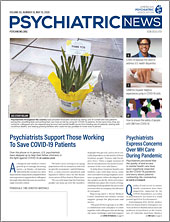Quality of and access to mental health treatment have been negatively impacted by the COVID-19 pandemic, according to psychiatrists surveyed in a study posted April 9 in Psychosomatics.
Scott Simpson, M.D., M.P.H., medical director of psychiatric emergency services at Denver Health and an associate professor of psychiatry at the University of Colorado Anschutz Medical Campus, and colleagues surveyed psychiatrists from March 19 to 30 and received responses from 101 psychiatrists in 29 states. They grouped the respondents by practice setting, including outpatient, hospital based, and “other” for those in forensic care and training programs.
“We used a narrow time frame, realizing it would result in a smaller sample size, but that will allow us to go back to this respondent set over time and watch how things change,” Simpson said. “We had to work quickly because things are changing so fast.”
Fifty-eight percent of respondents said the community response, such as stay-at-home orders, has negatively impacted the quality of mental health treatment, while 71% said the response has negatively impacted access to treatment.
Psychiatrists reported concerns over quality of and access to mental health care even as 91% said they have increased their use of telemedicine.
Respondents reported differences in how they’re getting information about COVID-19, as well. Many of those working in hospitals reported primarily getting information from their employers, while those in outpatient settings are relying on websites run by the government and professional organizations like APA.
At 95%, nearly all the respondents said they were somewhat or very worried about patients contracting and becoming ill with coronavirus.
“This was a very heartening finding to me,” Simpson said. “This is evidence that psychiatrists are dialed into a significant medical concern facing their patients.”
Few respondents reported interactions with COVID-19. Only 19% said they, friends, or family members have been tested for the virus. About a quarter said they had treated a patient with suspected COVID-19, and 3% had treated a patient who had a confirmed case. “The low observed contact rate may suggest that COVID-19 is not widely present among these clinicians’ patients, is not associated with significant psychiatric morbidity, or that mental health systems are not identifying patients at risk,” the authors wrote.
Simpson cautioned that the survey was conducted in late March, and with the fast-paced spread of the pandemic, perceptions may already be changing. Researchers plan to conduct a follow-up survey with the same respondents to see how views of the pandemic’s impact on mental health care evolve, particularly as people’s exposure to COVID-19 and interventions change, Simpson said.
Patricia Westmoreland, M.D., president of the Colorado Psychiatric Society and an author of the study, said she suspects the follow-up survey will show significant changes to psychiatrists’ perceptions of mental health care during the pandemic. “Even just a few weeks feels like a lifetime in the COVID era,” she said.
Some concerns about access to and quality of mental health care may be mitigated, she said, as psychiatrists previously unfamiliar with telemedicine become accustomed to the care delivery format.
But she is concerned with how the need for mental health treatment may rise acutely as the pandemic continues. “I think we are about to face a tsunami of mental illness from the effects of people being quarantined and isolated,” she said. “The social divides are also presenting a greater problem. It’s much easier if you’re wealthy to stay at home and access technology for the delivery of medical care, groceries, and meals. People whose incomes are lower don’t have that luxury.”
“Coronavirus and its ongoing public health response will carry lasting implications for psychiatric care,” the authors wrote. “The time to begin studying and anticipating those impacts is now.”
The survey was supported in part by an NIH/NCRR Colorado CTSI Grant.
Contents are the authors’ sole responsibility and do not necessarily represent official NIH views. ■
“Novel Coronavirus and Related Public Health Interventions Are Negatively Impacting Mental Health Services” is posted
here.
